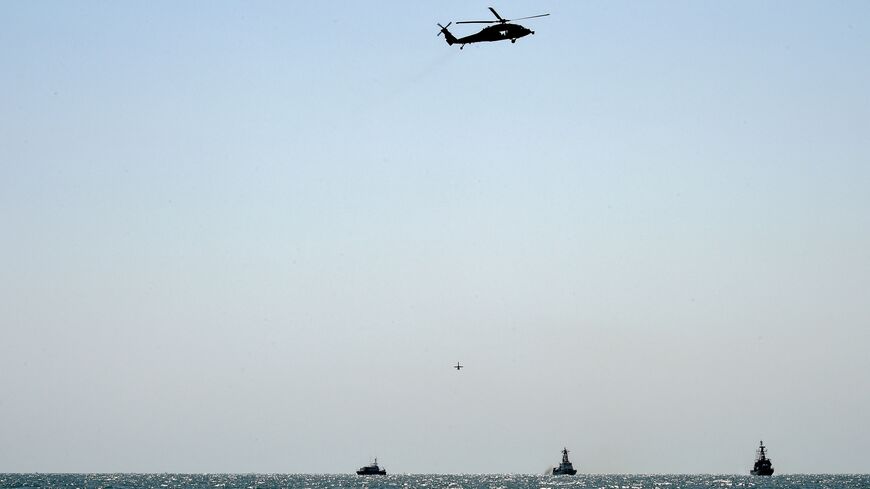WASHINGTON — The US has not received formal notification that the United Arab Emirates has any plans to stop participating in a multinational maritime security coalition led by the American Navy in the Gulf region, Al-Monitor has learned.
The UAE Foreign Ministry said on Wednesday that the country had withdrawn its participation from the Combined Maritime Forces (CMF) coalition.
“As a result of our ongoing evaluation of effective security cooperation with all partners, two months ago, the UAE withdrew its participation in the Combined Maritime Forces,” the UAE’s Foreign Affairs Ministry said in a press release.
“The UAE remains committed to responsibly ensuring the safety of navigation in its seas, in accordance with international law,” it continued.
The announcement gave no reason for the supposed end to the UAE's contribution.
Why it matters: The UAE is among 38 nations that voluntarily send personnel, ships and aircraft to CMF task forces in the Persian Gulf, Gulf of Oman and Red Sea.
Contributing militaries typically cycle forces into the coalition's roster as they become available and back out again when needed elsewhere.
A contingent of Emirati military staff departed CMF headquarters in Bahrain two months ago amid what US officials described to Al-Monitor as an apparently routine rotation.
The voluntary rotations regularly leave gaps in participation from many nations' militaries at any given time, and the UAE's absence is not unusual, Al-Monitor's sources said. Moreover, the US has received no formal notification from Abu Dhabi of any plans to stop participating in the CMF.
US Navy Fifth Fleet spokesperson Cdr. Tim Hawkins told Al-Monitor that as of Wednesday, the UAE had not formally withdrawn from the maritime security collective.
“The UAE is currently a CMF partner,” Hawkins told Al-Monitor via email. “That hasn’t changed. Regarding their level of participation as a partner, we leave it to our individual partners to speak to that.”
The coalition aims to deter weapons and drug smuggling, piracy and attacks – typically carried out by Iran – on commercial shipping. The UAE was not leading any of the CMF’s five task forces at the time its personnel were said to have departed Bahrain, according to the coalition’s website.
Military cooperation between the UAE and US has continued in recent weeks outside the framework of the CMF. Just last week, a US Navy destroyer conducted a passing exercise with an Emirati Navy ship in the Gulf of Oman.
What they’re saying: The foreign ministry's announcement is likely linked to Abu Dhabi's outstanding requests for security guarantees from Washington, a matter of renewed scrutiny in Congress.
Abu Dhabi's press release on Wednesday appeared to reference a Wall Street Journal article on Tuesday which reported Emirati officials were displeased that the US had not prevented Iran’s recent seizure of two civilian tanker ships, one of which was seized while transiting between two Emirati ports.
“The UAE has rejected the mischaracterization in recent press reports of US-UAE conversations regarding maritime security,” the announcement read. The article cited both US and Gulf officials.
Emirati officials have occasionally gone public to signal displeasure over what they have seen as insufficient efforts by the US military to ensure the UAE’s security.
In response to Iran’s recent seizures of two commercial tankers, the Biden administration earlier this month announced an increase in allied patrols in and around the Strait of Hormuz. The Pentagon did not send additional US ships or personnel to the region as part of the patrols, officials said at the time.
The context: Emirati officials were particularly concerned over Iran’s seizure of a Panama-flagged tanker as it sailed from the Port of Abu Dhabi to Fujairah on May 3, the Wall Street Journal reported Tuesday. The UAE has staked much of its international reputation as a safe haven for trade an investment in a tumultuous region.
The US Navy said it witnessed the May 3 tanker seizure from an unmanned drone circling overhead, but that it did not receive a distress call from the ship’s crew.
In January 2022, a barrage of armed drones killed three civilians near Abu Dhabi. The attack, which was claimed by Yemen’s Houthi rebels, marked the first known attack on the country’s territory by Iran’s proxies.
Emirati officials have described the attack as a major affront akin to the September 11th attacks on the United States, US officials have said.
Crown Prince Mohammed bin Zayed later declined a phone call from President Joe Biden in an apparent snub over the US’ delayed response, which culminated in the deployment of a US Navy destroyer and high-end F-22 fighter jets to Abu Dhabi more than a month after the attack occurred.
The US has withdrawn air defense systems and reduced its Navy rotations Gulf region in recent years. Pentagon officials say the withdrawals are necessary as the US prepares to deter future confrontations with China and Russia.
But the reduced footprint has led to a crisis of faith among partners and allies in the Gulf region about Washington’s commitment to their security, officials have said. Pentagon officials continue to encourage regional militaries to build their own capabilities with US support amid a heady pace of shared training exercises.
Both Emirati and Saudi officials have sought formal security guarantees from Washington, thus far to no avail. Just what those agreements would entail remains unresolved, officials said.
Chair of the Senate Foreign Relations Committee’s Middle East panel, Chris Murphy (D-NJ), pressed the State Department’s top regional official Barbara Leaf on Riyadh's reported interest in US security guarantees on Wednesday.
“We're very mindful of the sort of the right and left limits of what becomes a treaty versus something else,” Leaf replied.
Editor's note: This story has been updated since publication and edited for clarity.








